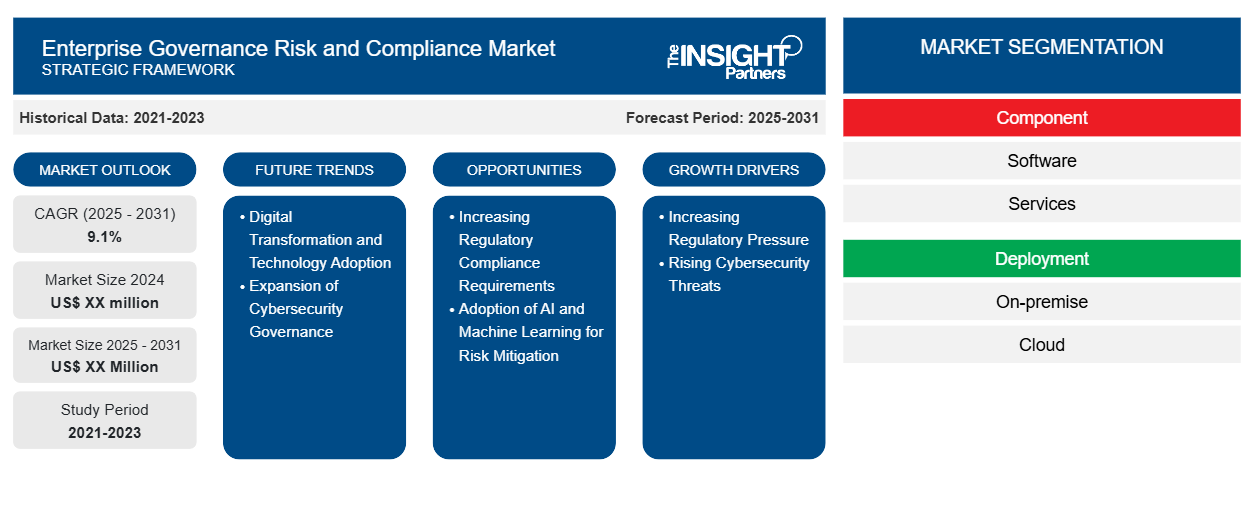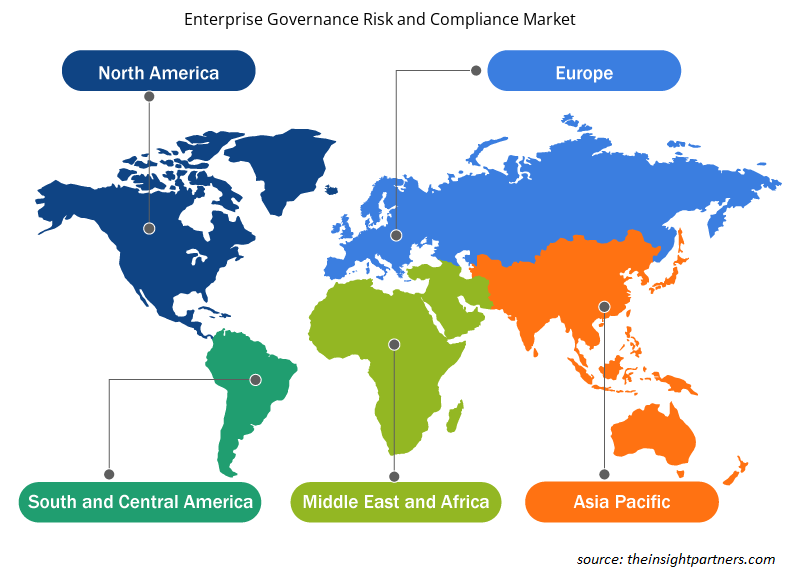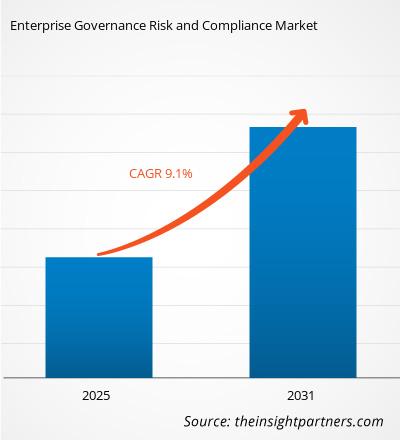The Enterprise Governance Risk and Compliance Market is expected to register a CAGR of 9.1% from 2025 to 2031, with a market size expanding from US$ XX million in 2024 to US$ XX Million by 2031.
The report is segmented by Component (Software, Services), Deployment (On-premise, Cloud), Enterprise Size (SMEs, Large Enterprises), Industry Vertical (BFSI, Manufacturing, Healthcare, Energy, IT and Telecom, Others). The global analysis is further broken-down at regional level and major countries. The Report Offers the Value in USD for the above analysis and segments.
Purpose of the Report
The report Enterprise Governance Risk and Compliance Market by The Insight Partners aims to describe the present landscape and future growth, top driving factors, challenges, and opportunities. This will provide insights to various business stakeholders, such as:
- Technology Providers/Manufacturers: To understand the evolving market dynamics and know the potential growth opportunities, enabling them to make informed strategic decisions.
- Investors: To conduct a comprehensive trend analysis regarding the market growth rate, market financial projections, and opportunities that exist across the value chain.
- Regulatory bodies: To regulate policies and police activities in the market with the aim of minimizing abuse, preserving investor trust and confidence, and upholding the integrity and stability of the market.
Enterprise Governance Risk and Compliance Market Segmentation
Component
- Software
- Services
Deployment
- On-premise
- Cloud
Enterprise Size
- SMEs
- Large Enterprises
Industry Vertical
- BFSI
- Manufacturing
- Healthcare
- Energy
- IT and Telecom
You will get customization on any report - free of charge - including parts of this report, or country-level analysis, Excel Data pack, as well as avail great offers and discounts for start-ups & universities
Enterprise Governance Risk and Compliance Market: Strategic Insights

- Get Top Key Market Trends of this report.This FREE sample will include data analysis, ranging from market trends to estimates and forecasts.
Enterprise Governance Risk and Compliance Market Growth Drivers
- Increasing Regulatory Pressure: The growing complexity of global regulations is one of the primary factors driving the GRC market. Regulations such as GDPR (General Data Protection Regulation), SOX (Sarbanes-Oxley Act), HIPAA (Health Insurance Portability and Accountability Act), and PCI DSS (Payment Card Industry Data Security Standard) demand enterprises to implement robust governance, risk, and compliance practices.
- Rising Cybersecurity Threats: Cyberattacks, including data breaches, ransomware, and insider threats, are escalating in both frequency and sophistication. Organizations are increasingly concerned about the risks associated with data loss and the potential reputational and financial damage.
Enterprise Governance Risk and Compliance Market Future Trends
- Digital Transformation and Technology Adoption: As businesses undergo digital transformation and embrace new technologies like cloud computing, IoT, AI, and big data analytics, they face new risks and challenges that must be effectively governed. The complexity of managing risks across diverse platforms (on-premise, cloud, hybrid) makes it crucial for businesses to implement GRC solutions that offer centralized governance, enabling visibility and control across all digital assets and ensuring alignment with enterprise risk management policies.
- Expansion of Cybersecurity Governance: With cyber threats becoming more sophisticated and frequent, cybersecurity is increasingly being integrated into the broader GRC framework. Companies will prioritize building strong cybersecurity governance models that align with compliance regulations like GDPR, HIPAA, and other industry-specific standards. As part of this trend, companies will invest in tools that automate and streamline compliance management for security frameworks, enhancing their ability to respond to cybersecurity incidents and vulnerabilities.
Enterprise Governance Risk and Compliance Market Opportunities
- Increasing Regulatory Compliance Requirements: The rising complexity of regulatory requirements presents a significant opportunity in the enterprise governance risk market. Organizations are under pressure to comply with evolving local and global regulations, such as GDPR and SOX. Governance, risk, and compliance (GRC) solutions will help enterprises streamline compliance processes, mitigate legal risks, and avoid penalties, driving demand for advanced software and services that automate regulatory tracking and reporting.
- Adoption of AI and Machine Learning for Risk Mitigation: The integration of AI and machine learning into GRC solutions offers substantial opportunities for risk identification and mitigation. AI can analyze large datasets to detect emerging risks, predict potential compliance breaches, and automate decision-making. By improving the accuracy of risk assessments, AI-powered GRC systems will enable organizations to respond proactively to threats, leading to increased demand for AI-enhanced governance risk solutions.
Enterprise Governance Risk and Compliance Market Regional Insights
The regional trends and factors influencing the Enterprise Governance Risk and Compliance Market throughout the forecast period have been thoroughly explained by the analysts at Insight Partners. This section also discusses Enterprise Governance Risk and Compliance Market segments and geography across North America, Europe, Asia Pacific, Middle East and Africa, and South and Central America.

- Get the Regional Specific Data for Enterprise Governance Risk and Compliance Market
Enterprise Governance Risk and Compliance Market Report Scope
| Report Attribute | Details |
|---|---|
| Market size in 2024 | US$ XX million |
| Market Size by 2031 | US$ XX Million |
| Global CAGR (2025 - 2031) | 9.1% |
| Historical Data | 2021-2023 |
| Forecast period | 2025-2031 |
| Segments Covered |
By Component
|
| Regions and Countries Covered | North America
|
| Market leaders and key company profiles |
Enterprise Governance Risk and Compliance Market Players Density: Understanding Its Impact on Business Dynamics
The Enterprise Governance Risk and Compliance Market is growing rapidly, driven by increasing end-user demand due to factors such as evolving consumer preferences, technological advancements, and greater awareness of the product's benefits. As demand rises, businesses are expanding their offerings, innovating to meet consumer needs, and capitalizing on emerging trends, which further fuels market growth.
Market players density refers to the distribution of firms or companies operating within a particular market or industry. It indicates how many competitors (market players) are present in a given market space relative to its size or total market value.
Major Companies operating in the Enterprise Governance Risk and Compliance Market are:
- Bwise
- Deloitte Touche Tohmatsu Limited
- IBM Corporation
- LexisNexis (RED Group)
- MetricStream Inc.
- Refinitiv
Disclaimer: The companies listed above are not ranked in any particular order.

- Get the Enterprise Governance Risk and Compliance Market top key players overview
Key Selling Points
- Comprehensive Coverage: The report comprehensively covers the analysis of products, services, types, and end users of the Enterprise Governance Risk and Compliance Market, providing a holistic landscape.
- Expert Analysis: The report is compiled based on the in-depth understanding of industry experts and analysts.
- Up-to-date Information: The report assures business relevance due to its coverage of recent information and data trends.
- Customization Options: This report can be customized to cater to specific client requirements and suit the business strategies aptly.
The research report on the Enterprise Governance Risk and Compliance Market can, therefore, help spearhead the trail of decoding and understanding the industry scenario and growth prospects. Although there can be a few valid concerns, the overall benefits of this report tend to outweigh the disadvantages.
Frequently Asked Questions
What are the options available for the customization of this report?
Some of the customization options available based on the request are an additional 3–5 company profiles and country-specific analysis of 3–5 countries of your choice. Customizations are to be requested/discussed before making final order confirmation#as our team would review the same and check the feasibility
What are the deliverable formats of the Enterprise Governance Risk and Compliance market report?
The report can be delivered in PDF/PPT format; we can also share excel dataset based on the request
What are the driving factors impacting the Enterprise Governance Risk and Compliance market?
The major factors driving the Enterprise Governance Risk and Compliance market are Increasing Regulatory Pressure and Rising Cybersecurity Threats.
What are the future trends of the Enterprise Governance Risk and Compliance market?
The integration of cloud computing, IoT, AI, and big data analytics is anticipated to play a significant role in the global Enterprise Governance Risk and Compliance market in the coming years
What is the expected CAGR of the Enterprise Governance Risk and Compliance market?
The Enterprise Governance Risk and Compliance Market is estimated to witness a CAGR of 9.1% from 2024 to 2031
- Historical Analysis (2 Years), Base Year, Forecast (7 Years) with CAGR
- PEST and SWOT Analysis
- Market Size Value / Volume - Global, Regional, Country
- Industry and Competitive Landscape
- Excel Dataset
- Parking Meter Apps Market
- eSIM Market
- Advanced Distributed Management System Market
- Online Exam Proctoring Market
- Electronic Data Interchange Market
- Barcode Software Market
- Maritime Analytics Market
- Cloud Manufacturing Execution System (MES) Market
- Robotic Process Automation Market
- Digital Signature Market
Testimonials
I wish to appreciate your support and the professionalism you displayed in the course of attending to my request for information regarding to infectious disease IVD market in Nigeria. I appreciate your patience, your guidance, and the fact that you were willing to offer a discount, which eventually made it possible for us to close a deal. I look forward to engaging The Insight Partners in the future, all thanks to the impression you have created in me as a result of this first encounter.
DR CHIJIOKE ONYIA, MANAGING DIRECTOR, PineCrest Healthcare Ltd.The Insight Partners delivered insightful, well-structured market research with strong domain expertise. Their team was professional and responsive throughout. The user-friendly website made accessing industry reports seamless. We highly recommend them for reliable, high-quality research services
Yukihiko Adachi CEO, Deep Blue, LLC.Reason to Buy
- Informed Decision-Making
- Understanding Market Dynamics
- Competitive Analysis
- Customer Insights
- Market Forecasts
- Risk Mitigation
- Strategic Planning
- Investment Justification
- Identifying Emerging Markets
- Enhancing Marketing Strategies
- Boosting Operational Efficiency
- Tracking Industry Innovations
- Aligning with Regulatory Trends
Yes! We provide a free sample of the report, which includes Report Scope (Table of Contents), report structure, and selected insights to help you assess the value of the full report. Please click on the "Download Sample" button or contact us to receive your copy.
Absolutely — analyst assistance is part of the package. You can connect with our analyst post-purchase to clarify report insights, methodology or discuss how the findings apply to your business needs.
Once your order is successfully placed, you will receive a confirmation email along with your invoice.
• For published reports: You’ll receive access to the report within 4–6 working hours via a secured email sent to your email.
• For upcoming reports: Your order will be recorded as a pre-booking. Our team will share the estimated release date and keep you informed of any updates. As soon as the report is published, it will be delivered to your registered email.
We offer customization options to align the report with your specific objectives. Whether you need deeper insights into a particular region, industry segment, competitor analysis, or data cut, our research team can tailor the report accordingly. Please share your requirements with us, and we’ll be happy to provide a customized proposal or scope.
The report is available in either PDF format or as an Excel dataset, depending on the license you choose.
The PDF version provides the full analysis and visuals in a ready-to-read format. The Excel dataset includes all underlying data tables for easy manipulation and further analysis.
Please review the license options at checkout or contact us to confirm which formats are included with your purchase.
Our payment process is fully secure and PCI-DSS compliant.
We use trusted and encrypted payment gateways to ensure that all transactions are protected with industry-standard SSL encryption. Your payment details are never stored on our servers and are handled securely by certified third-party processors.
You can make your purchase with confidence, knowing your personal and financial information is safe with us.
Yes, we do offer special pricing for bulk purchases.
If you're interested in purchasing multiple reports, we’re happy to provide a customized bundle offer or volume-based discount tailored to your needs. Please contact our sales team with the list of reports you’re considering, and we’ll share a personalized quote.
Yes, absolutely.
Our team is available to help you make an informed decision. Whether you have questions about the report’s scope, methodology, customization options, or which license suits you best, we’re here to assist. Please reach out to us at sales@theinsightpartners.com, and one of our representatives will get in touch promptly.
Yes, a billing invoice will be automatically generated and sent to your registered email upon successful completion of your purchase.
If you need the invoice in a specific format or require additional details (such as company name, GST, or VAT information), feel free to contact us, and we’ll be happy to assist.
Yes, certainly.
If you encounter any difficulties accessing or receiving your report, our support team is ready to assist you. Simply reach out to us via email or live chat with your order information, and we’ll ensure the issue is resolved quickly so you can access your report without interruption.





















 Get Free Sample For
Get Free Sample For